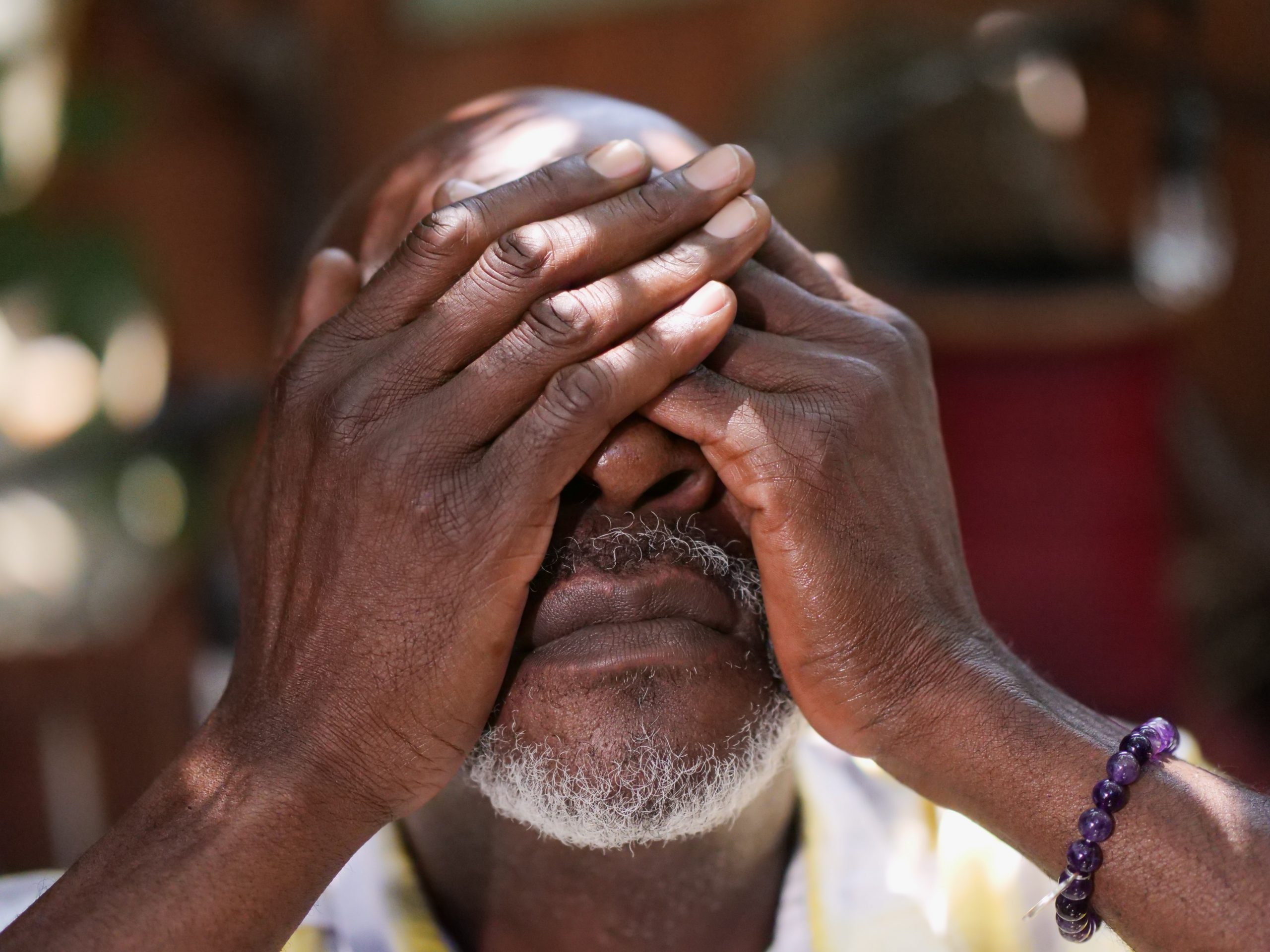How To Understand Depression If You’ve Never Had It
06.07.2021
How To Understand Depression If You've Never Had It
For your convenience here is the audio version of this article. Press Play to listen.

Depression is somehow everywhere and yet a subject that gets brushed under the rug; at once ubiquitous and taboo. If you’re lucky enough to have avoided depression, you almost definitely know someone who battles it daily – whether they’ve told you or not.
What to know when someone you’re close to has depression
The most important thing to know is that depression is not just sadness. It’s a deeply pervasive health condition that has devastating physical, mental, and emotional effects – and these all feed from each other.
When offering support, you have to understand these factors:
Depression is super serious. There is no snapping out of it. Depression is a thief that robs you of hope and willpower. Convincing your loved one to seek support will be incredibly tough, because fighting depression takes energy they may not have.
When they isolate themselves or push you away, it’s not personal. Depressed people lash out, say things they don’t mean, and struggle with meaningful connection for long periods of time. They don’t actually hate you. If you love them, you have to give them the space to heal.
Covering it up makes it worse. If your loved one feels that they can’t speak about depression, they won’t seek help. Avoiding the topic on their behalf adds to the shame.
They’re not lazy. They’re hurting. Even thinking about getting better can drain energy from people with depression. Those first steps are often the hardest to take. You have to be patient.
They are not yours to fix. A person has to heal from depression on their own terms. Trying to take ownership of their recovery process disempowers them and adds unrelenting pressure to your own life. You have to look after yourself. The responsibility lies with them. But you can help connect them with professionals, serve as an active listener, and provide reliable companionship.
Team Vippi wants to help you understand depression if your partner, your family member, or your friend has it. You could save a life.
Why understanding is important for providing support
The US stats for depression speak for themselves:
- In 2017, the last year data was recorded by the National Institute of Mental Health, 17.3 million adults over 18 years of age reported a major depressive episode.
- 13.1% of people aged 18-25 years reported having a major depressive episode.
- Roughly 35% of adults do not receive treatment for major depressive episodes.
Numbers aren’t people, though. You might well know someone with depression who’s never even clued you in on their battle. The stigma around depression perpetrated by previous generations (and many in our own generation) means that people don’t often talk about their mental health struggles.
Even without the stigma, it’s a complex health issue that people find difficult to describe. For this reason, approaching people who need support with nuance and sensitivity is one of the best ways to step up.
The bottling up of depression by many folks who live with it can mean they don’t get the help they need – and that can be fatal.
Helping your loved ones get through depression is not only about knowing the giveaway signs, but navigating the winding, pitch black corridors of someone else’s emotional journey. If you want to help, you need to become a pillar of support. And this involves knowing how to cope with being pushed away and when to give space.
What to look for: The signs and symptoms of depression
The weapon in your arsenal-of-understanding is that you know the people you love like the back of your hand. You know how they move, talk, and act through all moods.
When you pick up on the following signs of depression, it might be time to start paying more attention:
- They regularly express that they’re sad or in a bad mood.
- They seem to have lost interest in activities that once captivated them.
- They’ve gained or lost a lot of weight.
- They oversleep or barely sleep at all.
- They seem constantly drained of energy.
- They’ve become physically restless. Maybe they’re fidgeting, hand-wringing, or pacing back and forth.
- They start to express worthlessness or guilt.
- They’ve become extremely indecisive and seem to get distracted easily.
- They actively express thoughts around suicide or death. (This means it’s time for emergency mode to kick in.)
A doctor will often diagnose depression after some of these symptoms become apparent for 2 weeks.
How depression really feels
The physical signs are important to know – they could save the life of someone you love – but they don’t really let you in on how depression really feels. And that’s the key to understanding the havoc it wreaks on the mind.
Depression has a devastating mental, emotional, and physical impact.
- Mentally: You feel like the living dead – as if you’re in a cage for which you have the key but no desire to use it. It feels like a walking coma. During the day, your body is awake, but your mind is asleep. At night, your body is asleep, but your mind is awake. Everything’s backwards.
- Emotionally: Depression feels like a curse where nothing works – an absolute vacuum of time and energy. You want to talk, laugh, smile, paint, go for a walk, and live, but you simply don’t get round to it. You start to feel like you don’t deserve love – so when your folks send love your way, you push it back. And you will almost constantly lie about being okay.
- Physically: Waking up is an impossible task. When you finally manage it, you just want to go back to sleep – not because being awake is hard, but just so the day can end. Your neck aches from the weight of your head. The backs of your eyes might hurt, too. You’ll likely have a dull ache in the back of your head you can’t massage away.
This ingenious short film demonstrates the hollow, lonely feeling of depression in a way that might be more familiar to you:
This video positions depression as the feeling of:
- Entering a cold bathroom
- Running a hot, relaxing, candlelit bath
- Luxuriating in the bath
- Blowing out the candles, pulling the plug, and sitting with your dampness and coldness in the dark
- The sensation you’re left with …. is how depression feels.
If you truly want to understand what your loved one is going through, you can run this exercise yourself. The results are deeply uncomfortable. Sometimes, however, you have to get outside of your comfort zone to foster true understanding and empathy around depression.
Not all types of depression are the same.
Your friend/partner/family member might feel depressed. But everyone has a different journey through the condition, making their feelings extremely hard to pigeonhole (which is why you shouldn’t apply labels – just listen). Some of the types include:
- Major depression, when several of the above symptoms continue for at least 2 weeks
- Persistent depressive disorder (dysthymia), which describes depressive episodes that last for 2 years
- Situational depression, a form that develops after a loved one dies or you lose a job (you might have experienced this type, which can take the form of grief)
- Disruptive mood dysregulation disorder, which causes extreme anger and outbursts in younger people that are far more intense than would be expected
- Premenstrual dysphoric disorder, which is a severe presentation of PMS that women can experience around the time of their period
- Substance-induced mood disorder, which can happen while you’re drinking booze and taking harder drugs or after the usage stops
- Postpartum depression, which is the type that can occur in women after childbirth
- Seasonal affective disorder, when you feel depressed during certain months of the year
Brain structure and chemistry, environmental triggers, hormones, and a possible genetic link can all contribute to a person’s risk of developing depression. With the range of possible types and causes, it’s hopeless to try and “fix” your loved one. That’s simply not how depression operates.
If you talk with them, however, you can help them find some clarity on what might be behind their current mental state. So begins their potential road to recovery.
You now need to have difficult and important conversations.
It starts with talking. But that’s not always the answer. If you’re not familiar with how the condition feels, here are some suggestions you can use to open the conversation (and some to avoid).
What you can say to someone with depression
- “Things must be really tough for you right now. I’m here for you if you need to talk to someone.”
- “You might not see it right now, but you’re not always going to feel like this.”
- “Never be afraid to let me know how I can help you. Night or day, just reach out.”
- “I don’t understand how you feel – but I care about you deeply and will do whatever I can to help.”
- “Your life is important to me and to so many people.”
- “If you feel like giving up, convince yourself to sit through an extra minute. Then work up to an hour. Then a day. One moment at a time is all it takes.”
What you absolutely should *not* say to someone with depression
- “Sad is in your damn brain. Deal with it.”
- “Everyone has tough sh*t to cope with from time to time – we all just get on with it.”
- “Look on the bright side, at least…” (followed by something that obviously won’t help in the slightest)
- “I understand that you’re sad, but I can’t really do anything.”
- “You’re saying you want to die, but you’ve threatened suicide before – it’s just another cry for attention. Grow up.”
- “Snap out of it, then.”
- “It’s been ages. You should feel better by now.”
- “Worse things happen to others.”
Sometimes, the best thing to say is… nothing at all. Words aren’t always necessary for communication. Maybe they just need you to sit silently with them for a while – this can be therapeutic in its own right.
How to connect people with treatment
Anyone who has been through depression will tell you that recovery is theirs to control. Linking people to the help they need can feel like a thankless task at times – but it’s an essential first step.
The brutal power of depression is that it convinces people with it that they’ll never get better and siphons off every ounce of energy they can muster. This can make pursuing treatment feel like a Herculean task. It’s your job to understand this internal conflict and gently nudge your loved one toward doing the right thing for themselves.
They may not even admit they have depression. Understanding what to look for and helping them come to terms with the signs they’ve demonstrated can be a life-saving first step in their recovery journey.
Your primary role is as a listener. But you can take the following steps to raise treatment as a viable option:
- Recommend a visit to a family physician or GP. This might be a surprising first suggestion. But the same way depression carries a stigma to some people who’ve never experienced it, mental health professionals can be terrifying for people who have depression. A regular physician circumvents this, and they can also rule out other health problems that may be causing depression, like iron deficiency anemia.
- Offer to lend a hand with finding therapy and attending the first appointment. Every person is different. Every presentation of depression is different. Every therapist works differently. For these reasons, the process can seem daunting to a person with depression before it even begins – meaning that it often never does. Make it easier for them. Free resources are available from the National Institute of Mental Health to help you help your loved one. You should offer to go to the first appointment with them, even if you just wait outside in the car.
- Encourage them to write down their feelings. Journaling can provide relief in and of itself. But for people with depression, it can be a way to track potential triggers, prevailing symptoms, and potential underlying causes. When it’s in your own handwriting, reading “I paced back and forth and stared at the walls for a whole hour today” can be a powerful eye-opener when it comes to acknowledging that you need help.
What to do if your loved one is talking seriously about suicide
This is as much of a medical emergency as a heart attack or a stroke. The steps are:
- Make sure they are not alone. If you can’t be there yourself, contact a family member urgently.
- Ask them to hand over any weapons or sharp objects to you or the person keeping them company.
- In the U.S., contact 911 or The National Suicide Prevention Lifeline on 1-800-273-TALK. (Outside of the U.S., contact emergency services or check the International Association for Suicide Prevention site for the best rapid-response port of call near you.)
- Wait with them (or have someone wait with them) until help arrives.
Warning signs include:
- Someone actively talking about an urge to commit suicide.
- Someone making plans such as creating a will, offloading personal possessions, and saying goodbyes after a prolonged period of depression.
- Someone suddenly increases their level of dangerous or reckless behavior, such as deliberately dangerous driving or illicit drug use.
- Someone suddenly becomes extremely calm and blank after a prolonged period of emotional distress.
How to connect *with* people *during* treatment
The therapist is not running a daycare facility. The person you love doesn’t fall outside your responsibility the moment they start a course of treatment.
In fact, they might feel more raw and vulnerable than ever. They may be facing up to the side effects of meds or discussing painful topics in talk therapy. While someone with more letters after their name might be handling the bulk of the treatment, you should still be there for your loved one (because no amount of qualifications means they know the people you love better than you do).
Here’s how:
- Offer to help with whatever they need. Some people might not accept help – and that’s fine. But if they need support in sticking to appointments or medication regimens and looking at other avenues of treatment, be present.
- Set your expectations – and theirs. Therapy or antidepressant medication is not something at which you can simply “win”. It’s a slow, grinding process that involves a lot of trial and error and even more fallout. You have to realise at the outset that mental health professionals play the long game. And the victory might not even be absolute. Your loved ones may need regular interventions for the rest of their lives. But things will get better for them, and you can help them come to terms with the journey.
- Practice what you preach. You can’t go on boozy, drug-fuelled, junk-food-riddled benders yourself and expect your loved one to live a wholesome, balanced lifestyle that will encourage recovery. Use their recovery as an opportunity to lead by example. Hopefully, at some point in the future, they’ll join you on that run or hike.
- Get them involved. Isolation is a huge driver of depressive feelings. Make a point of reaching out when it comes to motivating activities. Invite them over to watch the Marx Brothers movies you grew up with. Cycle around the neighborhood together. Ask them to meet you at your favorite diner. You may even just want to head out on a simple walk. Never stop inviting them along when you’re doing something fun, even if they keep turning you down.
- Help them with chores. Daily function can be something of a grind for people with depression. Share the load. Take wet clothes to dry at the laundromat, or muck in with some gardening. Whatever gives them space to focus on recovery. But don’t get worn out yourself, and always know when to empower them to reassume control of their lives.
Don’t forget that you’re a person too
Who cares for you – the caregiver? If you get into a terrible place because you’re helping someone else, you’ll both eventually crash and burn. Even the natural fixers among us need to step back from time to time.
There are some surefire ways to reduce the risk of caregiver burnout.
- Communicate honestly. You will face letdowns, lashings out, and regular challenges when supporting a person with depression. You can still demonstrate patience while speaking out. Staying silent and harboring resentment is certainly not healthy for you – and your loved one will pick up on it, making them feel worse.
- Know that you can only go so far. You don’t have limitless resources, and you’ve a life of your own to tend to. Don’t let someone else’s depression control your life. Set firm boundaries and clear limits. After a certain number of distraught 4 a.m. phone calls in a row, you have to draw a line in the sand. Just as alcohol shouldn’t become a crutch to a depressed loved one, neither should any one person – for both their sake and that of the caregiver.
- Maintain your own lifestyle. Falling off track with your life might start you on a similar path to your loved one. Make sure you keep up that exercise routine, stick to your other commitments, and keep up with social engagements. Of course you can deviate to help a friend in need, but make that the exception rather than the rule – it’s part of leading by example.
- Sometimes, you’ll also need the help of others. You’re not a superhero. You don’t need to bottle up your own feelings about the situation. Without divulging details, you can still visit your religious leader, counselor, or even a therapist of your own to vent your own frustration and sadness about the situation. You’re allowed to feel and talk about those things, just as your loved one is allowed to feel depression.
The roundup
You can now see how starting with a level of understanding can unfold into real, tangible support during a period of recovery.
Depression takes many forms and is extremely complicated. But a friend or family member with open communication, active listening, and deep, compassionate patience can make the difference between a good and bad day for someone with depression. Be that guiding light – but know your limits and stay on top of your own physical, emotional, and mental health too.
You can make treatment easier to find and stick with and help them re-engage with a healthy, balanced life.
Article resources:
- American Psychiatric Association. (2020). What is depression? https://www.psychiatry.org/patients-families/depression/what-is-depression
- Depression: Supporting a family member or friend. (2018). https://www.mayoclinic.org/diseases-conditions/depression/in-depth/depression/art-20045943
- Helping someone with depression. (2020). https://www.helpguide.org/articles/depression/helping-someone-with-depression.htm
- National Institute of Mental Health. (n.d.). Help for mental illnesses. https://www.nimh.nih.gov/health/find-help/index.shtml
- National Institute of Mental Health. (n.d.). Major depression. https://www.nimh.nih.gov/health/statistics/major-depression.shtml
- Pamuk, G. E., et al. (2015). Gastrointestinal symptoms are closely associated with depression in iron deficiency anemia: a comparative study. https://www.ncbi.nlm.nih.gov/pmc/articles/PMC6152543/
- Recognizing suicidal behavior. (2017). https://my.clevelandclinic.org/health/articles/11352-recognizing-suicidal-behavior
- What is depression? (2020). https://www.webmd.com/depression/guide/what-is-depression
- Yuen. C, et al. (2021). Why mood tracking could be your answer for avoiding burnout. https://greatist.com/grow/mood-tracking-journal


















